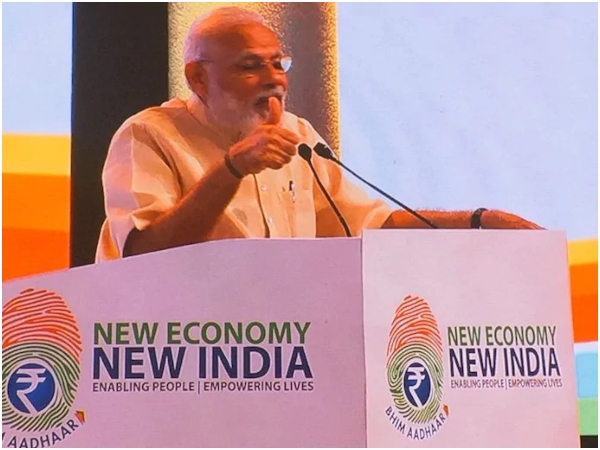Indian Economy and the Wolves of Yellowstone
Total Views |
- Aniket Pingley
(https://www.linkedin.com/in/aspingley/)
Will NaMo listen? Will he deliver? Will his Mann-ki-Baat become Karma-ki-Baat? ‘Ecommonomics’, i.e. the common-sense economics of a common man.
Few years back I had watched a small documentary about the reintroduction of wolves in the Yellowstone National Park (USA), and how that changed its ecosystem for better¹. The video is embedded below. I have visited Yellowstone National Park (YNP) in 2013. It is a geological marvel and UNESCO World Heritage Site.

Without going into details¹, here is how the story of the reintroduction of wolves unfolded. In the 1930s, wolves were hunted out completely from YNP, which resulted in ecological imbalance. Their reintroduction in 1995 triggered a cascading effect among animals and plants. They started hunting the herbivores (e.g. Elk) who would otherwise eat off saplings of big trees. Thus willows became available for beavers to thrive. Beavers are masters at building natural dams and ponds. Naturally fishes began to thrive and also the water table rose. It did not stop there. Herbivores had to move deeper into woods thus breaking their herds into smaller sizes, which made them more susceptible to being hunted. This benefited the scavengers like ravens, eagles, magpies, etc. as they were no more dependent on harsh winter to find their prey. Even the bears who also feed on berries benefitted from the lack of rampant grazing. The cascading effect was so great that even the rivers changed their course in response! When I visited YNP, the thriving ecological diversity was unmistakably evident.
Question: Which/What are the “Wolves” for bringing balance and cascading growth to the Indian economy that is currently in a tailspin?
Even before the pandemic of #WuhanVirus set upon the world, the state of the Indian economy was in severe distress, especially in the MSME sector. The measures of lockdown to contain the pandemic have exacerbated the state of the economy to a seemingly irrecoverable state, at least for the next few years. The PMO is grossly responsible for the current fiscal misadventures and poor implementation of reforms, which have merely remained a lip-service. It is baffling how a stable government with a clear license-to-reform shows no appetite of listening to its well-wisher critics and economy-experts such as Subramanian Swamy, S Gurumurthy, and R Vaidyanathan. Listed below are the three prominent steps that these three have suggested, respectively:
• Use the humungous cash reserves available with RBI to kick-start infrastructure construction (like roads, warehouses, etc.). Print currency if required to support these activities².
• Recognize the model of economics (Swadeshi) that works (has been working since independence) on the ground rather than sticking to theories from the era of globalization. It will be determinantal to not embed this model into national economic planning³.
• Bring in reforms to remove legal hurdles in starting new small businesses. Given the majority of the Indian economy is run by the self-employed MSME sector, it is appalling that the legacy of red-tapism and ‘babudom’ still functions largely⁴.
I am no expert in economics. Thus, I will provide my two-cents on ‘ecommonomics’, i.e. the common-sense economics of a common man :). Following two, in my limited understanding, will have a major cascading effect on kickstarting the economy taking into consideration the after effects of the pandemic. They can be considered the “wolves” that will bring back balance to the Indian economy.
• Abolish personal income tax: The key to recovery is getting people to spend and invest, which will result in an increase in the collection of GST. In addition, create government-managed mutual funds that fund the MSME sector, which in turn will reduce dependency on banks to give loans. The capital to run businesses in the country must come largely from its people. Let the citizens turn their saving from income tax into an indigenous investment, which will reduce dependence on foreign capital from hostile countries like China.
• Slash RTO taxes on automobiles: The automobile industry is a very large umbrella. Besides direct employment, sectors like insurance, servicing, advertising, travel, hospitality, etc. are greatly influenced by the automobile industry. Asking citizens to pay a one-time road tax hinders their ability in buying more expensive cars. Slashing RTO taxes or making them payable in installment by the year could enable direct and indirect growth in multitudes of sectors.
The hopes of the nation are pinned on PM Narendra Modi. There is no better leader in India who represents the aspirations of the common man. However, he has failed to deliver on the economic front as per the expectations of the electorate. Blaming only the administrative service cadre for policy implementation failure after being six into the government is childish at best.
Will NaMo listen? Will he deliver? Will his Mann-ki-Baat become Karma-ki-Baat?
Bharat Mata Ki Jai
References-
[1] Wolf Reintroduction Changes Ecosystem in Yellowstone
[2] “Words of Wisdom”, on the topic of Indian economy post COVID-19, Dr Subramnian Swamy
[3] “Current economic thinking is not in tune with the Swadeshi model. This has to change”, S Gurumurthy
[4] Global-socio economic outlook post-COVID-19, Professor R Vaidyanathan
(First published at- https://medium.com/triyugi/indian-economy-and-the-wolves-of-yellowstone-cce150fc327f)

